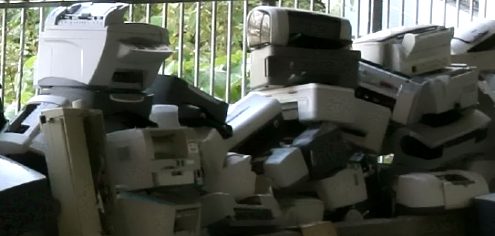Don't print your way into trouble
Don't print your way into trouble

The rise of the internet has created a repository of knowledge and services that are accessible from nearly anywhere in the world.
Of course, none of this comes free. So, almost any service you use online will require you to surrender some personal information. The companies who use this data have to protect it at every stage.
If your business stores and processes sensitive data (and let's face it: whether it's your accounts or customer database, most do), are you sure you know all the places it ends up?
What's hiding in your printer?
Did you know that printers and scanners store information sent to them?
They do this for performance reasons; to minimise the amount of data being transferred or to reduce the time it takes to get ready to print.
For instance, imagine you send a print request for ten copies of a document. Your printer will save the document once, then print the additional copies from this memory. This means it doesn't have to receive and process ten individual files.
The same happens when you scan, fax, or utilise pretty much any feature on offer from your reliable office all-in-one device. When you tally the amount of print requests you send, the information at risk can soon mount up.
How does this affect your company?
Take a quick guesstimate: how many customer-related documents are sent through your printer each day?
If you’re thinking of a number higher than zero, this issue should be of concern to you whenever you are looking to replace your office hardware.
Disposing of equipment responsibly, paying particular attention to any memory built into it, will protect you from future problems. At Stinkyink.com we crush the memory chips of any printer we discard.
It’s the only way we can guarantee that the 100,000 people on our customer database are fully protected, to the same level we ourselves wish to be.
Did you know your printer memory could hold hidden secrets? Do you know of anyone who has struggled with security issues like this? Are you concerned about misuse of your own information?
John Sollars is MD of Stinkyink.com
(Image of a printer graveyard from Flickr user wonderferret under a Creative Commons Attribution licence.)




Comments
Add a comment